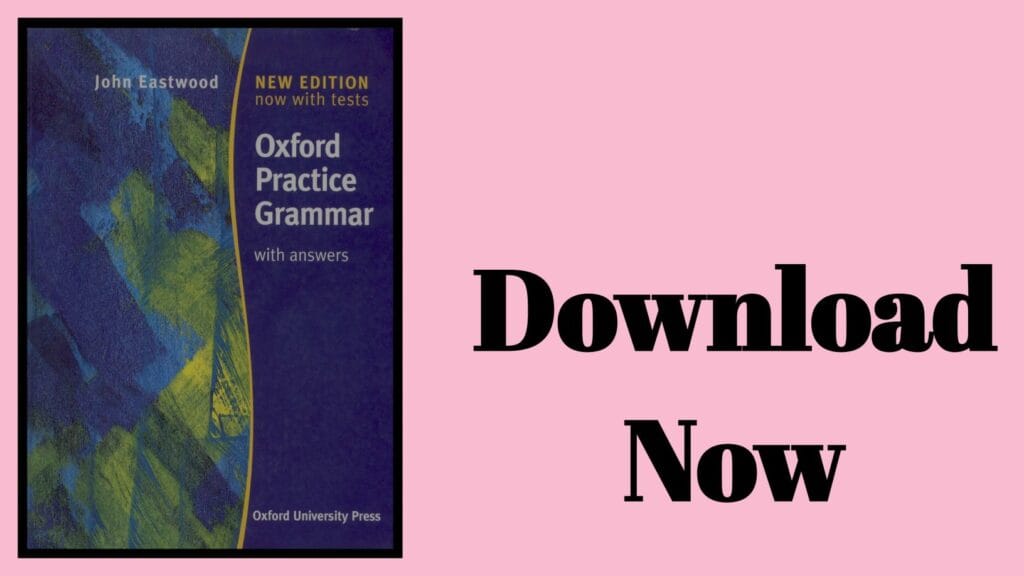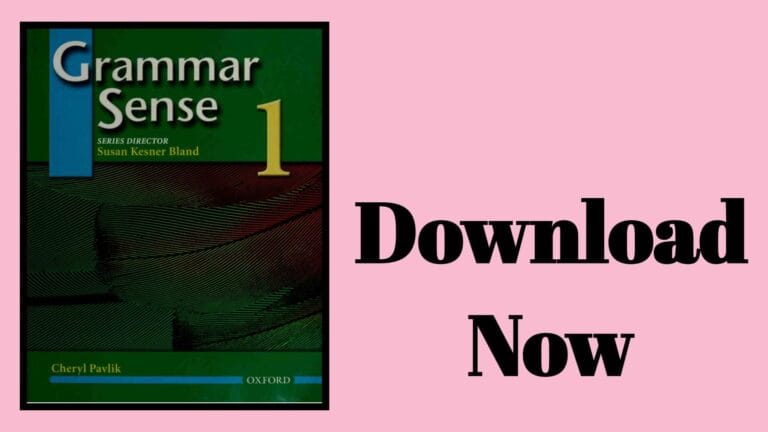
The Description of the Book
“Oxford Practice Grammar with Answers” is a comprehensive book written by John Eastwood on English grammar. The book covers almost all the topics of the English grammar. It has been written keeping in mind the readers’ needs in the world of grammar. The book’s aim is to prepare its readers an efficient speaker of English.
The book covers essential topics such as tenses, their types, voices: present, past, future, word classes: noun, verb or adjective, sentence structures: subject, verb, object, adjuncts, types of verbs, action, stative, direct and indirect speeches, modal verbs and their characteristics and conditional sentences.
“Less is more” is what has been maintained in the book which means that the author has made sure to avoid including a number of grammar topics making it catchy and rememberable for the students providing beautifully written lessons which are engaging, interesting and useful.
For Whom is This Book?
The contents of the book implies that the book can be used by beginner and intermediate learners of English grammar in order to learn and revise the grammar lessons provided in it. The beginners can use to gain more knowledge about grammar while the intermediate learners can read it for the sake of revision.
If you’re a beginner learner, then make sure to turn each and every page of the book and browse through all the contents without giving any miss to a page. In case you’re an intermediate learner, you’ll want to first go through the table of contents and choose the right topics or the topics which you think need your attention.
The Amazing Features of the Book
Written by a renowned grammar writer, John Eastwood, the book has got a number of interesting features which attract the readers toward the book itself. Here are the features of the book:
- Clean Grammar Topics: The author has made sure that you’re learning English grammar, not other things. Therefore, he ensured to talk only about the essential topics that are relevant for your grammar level. You’ll find plain English grammar rules in the book.
- Examples and Explanation: First, the rules of the grammar are discussed, then the examples followed by explanation where needed are given in the book. Thus, the writer makes sure that your reading of this book becomes enjoyable and your efforts go into a meaningful book.
- Important Grammars: Grammar topics such as word classes, sentence structures, narrations, tenses, wh question words, modal verbs, conditionals have been discussed in great details with his simple grammar teaching style which includes mentioning the rule, giving the example and providing the explanation.
- Practice Tests: The book features a number of practice tests which is at the heart of the book. The grammar practice tests make sure that you learn grammars through practice tests with explanation followed. Therefore, you’ll find twenty five sets of tests in the book which raise questions about different grammar topics and then give answers to them with explanation.
The Table of Contents
Introduction
Key to symbols
Starting test
Words and sentences
Word classes: nouns, verbs, adjectives, etc.
Sentence structure: subject, verb, object, etc.
Direct and indirect objects
Verbs
The present continuous
The present simple
Present continuous or simple?
State verbs and action verbs
Test 1: Present tenses
The past simple
The past continuous
Past continuous or simple?
Test 2: Past simple and past continuous
The present perfect (1)
The present perfect (2): just, already, yet; for and since
The present perfect (3): ever, this week, etc.
Present perfect or past simple? (1)
Present perfect or past simple? (2)
Test 3: Present perfect and past simple
The present perfect continuous
Present perfect continuous or simple?
The past perfect
Review of the past simple, continuous, and perfect
The past perfect continuous
Test 4: Past and perfect tenses
Review of present and past tenses
Test 5: Present and past tenses
Introduction to the future
Will and shall
Be going to
Will and be going to
Present tenses for the future
When I get there, before you leave, etc.
Test 6: The future with will, be going to, and present tenses
Will be doing
Will have done and was going to
Review of the future
Test 7: The future
The verb have
Short forms, e.g., it’s, don’t
Emphatic do
Questions, negatives, and answers
Yes/no questions
Short answers, e.g., Yes, it is.
Wh-questions
Subject/object questions
Prepositions in wh-questions
Who, what, or which?
Test 8: Questions
Negative statements
Negative questions
Question tags, e.g., isn’t it?
So/Neither do I and I think so
Test 9: Questions, negatives, and answers
Modal verbs
Ability: can, could, and be able to
Permission: can, may, could, and be allowed to
Possibility and certainty: may, might, could, must, etc.
Necessity: must and have to
Necessity: mustn’t, needn’t, etc.
Should, ought to, had better, and be supposed to
Asking people to do things
Suggestions, offers, and invitations
Will, would, shall, and should
It may/could/must have been, etc.
Test 10: Modal verbs
The passive
Passive verb forms
Active and passive (1)
Active and passive (2)
Special passive structures
Have something done
To be done and being done
Test 11: The passive
The infinitive and the -ing form
Verb + to-infinitive
Verb + -ing form
Verb + to-infinitive or verb + -ing form?
Like, start, etc.
Remember, regret, try, etc.
Test 12: Verb + to-infinitive or -ing form
Verb + object + to-infinitive or -ing form
Question word + to-infinitive
Adjective + to-infinitive
For with the to-infinitive
The infinitive with and without “to”
Verb/Adjective + preposition + -ing form
Afraid to do or afraid of doing?
Used to do and be used to doing
Preposition or linking word + -ing form
See it happen or see it happening?
Some structures with the -ing form
Test 13: The infinitive and the -ing form
Nouns and articles
Countable and uncountable nouns
A carton of milk, a piece of information, etc.
Nouns that can be either countable or uncountable
Agreement
Singular or plural?
Pair nouns and group nouns
Two nouns together
Test 14: Nouns and agreement
A/an and the (1)
A/an and the (2)
A/an, one, and some
Cars or the cars?
Prison, school, bed, etc.
On Friday, for lunch, etc.
Quite a, such a, what a, etc.
Place names and the
Test 15: A/an and the
Pronouns
This, that, these, and those
My, your, etc., and mine, yours, etc.
The possessive form and of
Some and any
A lot of, many, much, (a) few, and (a) little
All, half, most, some, no, and none
Every, each, whole, both, either, and neither
Test 16: Pronouns
Personal pronouns, e.g., I, you
There and it
Reflexive pronouns
Emphatic pronouns and each other
The pronoun one/ones
Everyone, something, etc.
Test 17: Pronouns
Adjectives and adverbs
Adjectives
The order of adjectives
The old, the rich, etc.
Interesting and interested
Adjective or adverb? (1)
Adjective or adverb? (2)
Test 18: Adjectives and adverbs
Comparative and superlative forms
Comparative and superlative patterns (1)
Comparative and superlative patterns (2)
Test 19: Comparative and superlative
Adverbs and word order
Yet, still, and already
Adverbs of degree, e.g., very, quite
Quite and rather
Too and enough
Test 20: Adverbs and word order
Prepositions
Prepositions of place
In, on, and at (place)
In, on, and at (time)
For, since, ago, and before
During or while? By or until? As or like?
Preposition + noun, e.g., on holiday
Noun + preposition, e.g., trouble with
Adjective + preposition, e.g., proud of
Test 21: Prepositions
Verbs with prepositions and adverbs
Prepositional verbs, e.g., wait for
Verb + object + preposition
Phrasal verbs (1)
Phrasal verbs (2)
Phrasal verbs (3)
Verb + adverb + preposition
Test 22: Verbs with prepositions and adverbs
Reported speech
Direct speech and reported speech
Reported speech: person, place, and time
Reported speech: the tense change
Reported questions
Reported requests, offers, etc.
Test 23: Reported speech
Relative clauses
Relative clauses with who, which, and that
The relative pronoun as object
Prepositions in relative clauses
Relative structures with whose, what, and it
The use of relative clauses
Relative pronouns and relative adverbs
Relative clauses: participle and to-infinitive
Test 24: Relative clauses
Conditionals and wish
Conditionals (1)
Conditionals (2)
Conditionals (3)
Review of conditionals
If, when, unless, and in case
Wish and if only
Test 25: Conditionals and wish
Linking words
But, although, and in spite of
To, in order to, so that, and for
Review of linking words
Links across sentences
Appendices
Word formation
The spelling of endings
Punctuation
Pronunciation
American English
Irregular verbs
Key to the starting test
Key to the exercises
Key to the tests
Index


